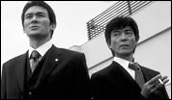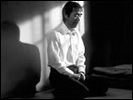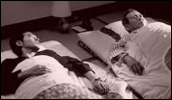Half a Confession
- Year
- 2004
- Original title
- Hanochi
- Japanese title
- 半落ち
- Director
- Cast
- Running time
- 121 minutes
- Published
- 13 September 2006



by Mike Dillon
Half a Confession introduces itself as a thriller and abruptly changes gears, transforming into a tale of morality with deeper insights into its characters than we had anticipated. It begins when Soichiro Kaji (Terao), a retired detective, walks into police headquarters and confesses to the murder of his wife. We learn that the victim had prematurely developed Alzheimer's after the tragic death of their son, and in her suffering, had asked to die. The police chiefs would be far more content to take him at his word if it were not for a conspicuous hole in his story: 48-hour gap between the alleged murder and his confession. Fearing a public relations nightmare, they are eager to bury the incident and keep the press in the dark.
The term "hanochi" is police jargon for when a criminal's admission of guilt proves unsatisfactory, lacking pieces of information needed to complete the picture. Much of the film will concern Kaji's actions and whereabouts in the days following his wife's death, and eventually, a full story emerges, the details of which I will not reveal. The mystery surrounding the murder, however, is a deliberate misdirection; lengthy sections of the film involve a series of peripheral characters whose lives intersect throughout the investigation and subsequent trial.
There is ostensibly no single protagonist here, as the plot floats between individuals already at odds with their careers (some more than others, some more than they realize) before they are pulled into Kaji's life. They include a detective and the case prosecutor, both pursuing the facts but under pressure from superiors to whitewash their findings; a female reporter, whose editor uses their affair as emotional leverage over her future; a defense lawyer, who loves pro-bono work but pursues this high-profile client to secure a better life for his family; and the young judge presiding over the court hearings, who sees troubling parallels in Kaji's life with his own. Finally, there is Kaji's sister-in-law (Kiki), whose remorse for having witnessed the meltdown of her only family is more than she can bear. In the precious few moments she appears on-screen, Kiki comes away with the most heartbreaking performance of all.
Rest assured that, despite such a laundry list of characters, the film is never unfocused. And while we keep expecting villainy or sudden double-crosses, there are no such developments. Rather, the more their stories unfold, the more we regard with empathy the decency of these people, caught squarely between their personal conscience and the professional ethics that accompany their positions as public servants. The filmmakers are smart to use their conflict as an invitation for the audience to consider the wider implications of the story and its painful questions concerning euthanasia and assisted suicide.
Nearly every actor strikes the right tone, and the strength of their performances allow us to forgive the occasional grandstanding theatrics. Only toward the end does the film draw dangerously close to shooting itself in the foot when the judge (a miscast Yoshioka) has a crucial monologue that is intended to enlighten but comes across as a dithered whine. The melodrama teeters over into the flagrantly melodramatic and never fully recovers, receiving little help from an incessant musical score that panders too much to our heartstrings.
How unfortunate that a film indicative of a vibrant, healthy national cinema is unlikely to find an crowd beyond, at best, broader East Asia. Distribution is less likely in the West, where the current - limited - market is saturated with darlings of the festival circuit or the "translatable" popularity of fast action and horror. Granted, most mass-market films churned out by the once major studios deservedly languish in international obscurity, but as a film like Katsuyuki Motohiro's Bayside Shakedown has shown, mainstream Japanese film does occasionally manage to be universal in its appeal.
Based on the novel by Hideo Yokoyama, Half a Confession demonstrates a stark ability for Japan's domestic industry to resist the draw of the global arena to produce quiet, introspective dramas for its own audiences. It went on to receive awards for Best Picture and Best Actor (Terao) at the 2005 Japanese Academy Awards (where it was nominated in 10 other categories) and Best Actor at the 2005 Blue Ribbon Awards.
None of this would work were it not for the commanding presence of Akira Terao as Kaji. Terao is a rare actor of boundless nuance, whose deeply compassionate eyes communicate volumes in scenes of little dialog. The film owes a lot to his portrayal of a man whose silence masks the sadness of someone utterly defeated by the circumstances of his life. Fascinating how even though no one excuses his crime, none blame him, nor question his integrity. Several of the film's most effective scenes involve characters caught off guard by Kaji's disarming goodness, coming away tormented for not being better themselves.
By the end, we are glad to see the story circle back to Kaji, not only for his discovery of hope, but because it rightly avoids providing the other characters with a substantive denouement. For them, the ramifications of their actions remain uncertain, their lives still open-ended where Kaji has found closure. Making the choices that define our lives is only half the battle. It's making peace with the consequences that matters next.